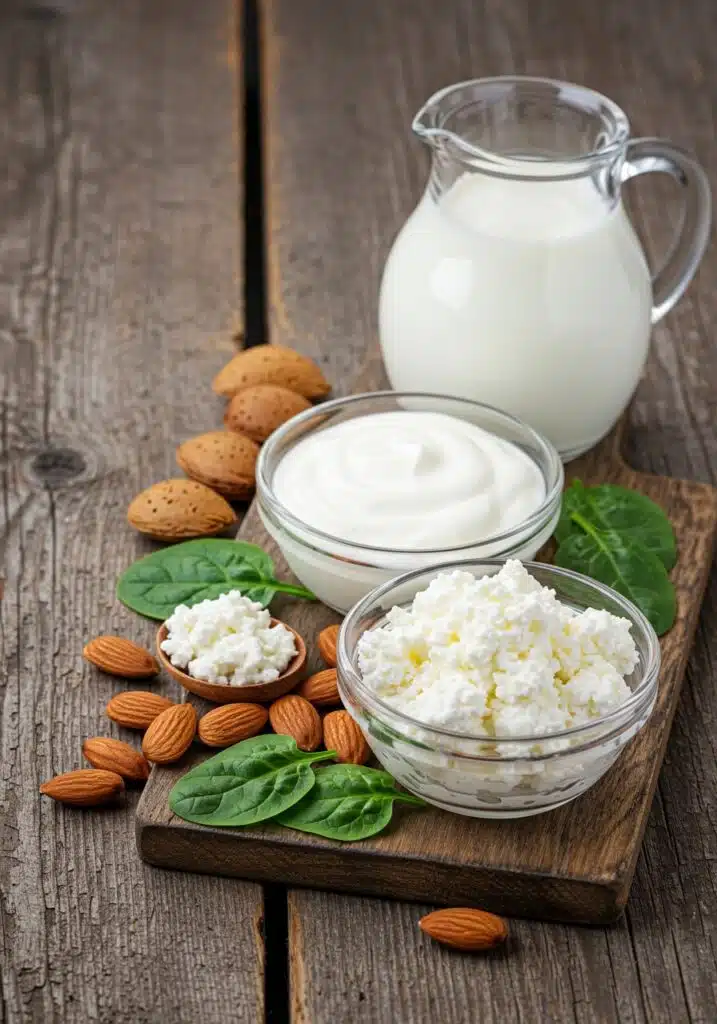“You don’t have to eat boring to eat healthy,” my gym buddy told me one morning as we compared our breakfasts. That really stuck with me. Protein-rich foods are a game changer, they keep you full, fuel your workouts, and help you recover faster. But let’s be real: when you look into your fridge for a quick, high-protein meal, you probably end up torn between two staples, cottage cheese vs Greek yogurt.

I remember my first serious attempt at a protein-heavy dinner bowl, I thought Greek yogurt was the obvious choice. Smooth, creamy, and super familiar. But then one day I gave cottage cheese a shot, and wow, I was hooked. Suddenly my bowl was more than just “the usual,” it was loaded with this unique texture and a ton of staying power, kind of like my Greek Cottage Cheese Bowl or my go-to Smoked Salmon Cottage Cheese Bowl. That’s when my little obsession with comparing cottage cheese vs Greek yogurt really began.
If you’re anything like me, always looking for easy ways to hit your protein goals without spending forever in the kitchen, you’ve probably wondered which one is better too. That’s exactly what we’re going to talk about. Let’s break down the nutritional side of things so you can finally decide which deserves a permanent spot in your bowl tonight, maybe even alongside some of my other high-protein favorites like my Cottage Cheese Taco Bowl!
Cottage Cheese vs Greek Yogurt: Nutritional Face-Off
When it comes to protein, both cottage cheese and Greek yogurt flex serious muscle. But they do have some key differences that can make or break your meal plan, and trust me, I learned this the hard way after one too many bland dinners!
First off, let’s look at protein per serving. A typical 1-cup serving of cottage cheese can pack around 24–28 grams of protein. That’s honestly nuts, I remember thinking, “Where has this stuff been all my life?” On the other hand, plain nonfat Greek yogurt offers about 18–22 grams per cup. Don’t get me wrong, that’s still super solid. But if you’re chasing those extra protein grams without cranking up your portions, cottage cheese is kinda the winner in this cottage cheese vs Greek yogurt debate.
Next up is the calories and carbs. Greek yogurt usually comes in leaner, often around 100–120 calories per serving with 5–8 grams of carbs. Cottage cheese can jump up closer to 180 calories per cup, with around 6–10 grams of carbs depending on the brand and fat level. When I was stricter on my carb tracking last summer, I’d lean on Greek yogurt a bit more for those lower numbers. But if you’re fine with a slightly higher calorie hit (and want to stay fuller longer), cottage cheese really delivers.
And then there’s fat content, whole-milk versions of both are obviously richer and more indulgent. Personally? After trying both low-fat and full-fat versions, I go for 2% most of the time, creamy enough to feel satisfying but not too much that it throws my goals off.
That protein density is what really sold me on cottage cheese as my go-to base for high-protein dinner bowls. It’s super filling without feeling heavy, which is exactly what I want after a long day. That’s why I tend to lean toward cottage cheese in most of my recipes, especially when deciding between cottage cheese vs Greek yogurt. Plus, the added texture and flavor make cottage cheese bowls feel more like a meal than a snack.
Flavor and Texture Differences That Actually Matter in Cottage Cheese vs Greek Yogurt
When I first started messing around with cottage cheese vs Greek yogurt in my meals, the biggest surprise was the texture. Like, sure, they’re both creamy-ish and high-protein, but they hit your spoon and your taste buds in totally different ways. And honestly, this can make or break your dinner bowl.
First off, let’s talk cottage cheese. It’s kind of lumpy, in a good way. Picture those soft little curds swimming in a silky, creamy base. It adds this super fun, rustic mouthfeel to every bite. I remember the first time I stirred cottage cheese into a savory bowl with cucumbers and herbs, and I thought, “Why haven’t I been doing this forever?” That chunkiness breaks up the texture and feels more substantial than a completely smooth base. Plus, with cottage cheese vs Greek yogurt, cottage cheese has that salty-savory edge that pairs really well with dinner foods like olives, tomatoes, or even smoked salmon.
Greek yogurt? Total opposite. Greek yogurt is like the super smooth, super thick sibling in this cottage cheese vs Greek yogurt comparison. It’s super creamy, almost like a light sour cream. The texture feels rich, but it stays uniform. That uniformity can be great when you want a silky consistency, like if you’re swirling in nut butter or protein powder, but for dinner bowls? Sometimes it feels like too much of the same thing. I learned that the hard way after making a Greek yogurt bowl with veggies once. It was good, sure, but the uniform creaminess didn’t keep me as interested bite after bite.
And let’s not forget the flavor. Greek yogurt usually leans tangy. That tang can work magic with fruits, honey, or granola, and I use Greek yogurt for sweet stuff all the time, but in dinner recipes? That tang can fight with savory toppings unless you’re super careful with seasoning. Meanwhile, cottage cheese is milder, a bit salty, and way more adaptable. When I’m making a savory bowl, cottage cheese just lets the toppings shine without overpowering them.
One time I did a side-by-side dinner experiment, one bowl with cottage cheese and one with Greek yogurt, both topped with cucumbers, tomatoes, and a sprinkle of feta. I was shocked at the difference. The Greek yogurt bowl was smooth but kind of flat, like all the flavors were floating on top. The cottage cheese vs Greek yogurt bowl? Every forkful had different textures and flavor pops. It felt more like a complete meal.
That’s my go-to now: if I want a bowl that’s going to keep me interested and feel like dinner, cottage cheese usually wins. But Greek yogurt? I save that for breakfasts or snacks, where its smooth, tangy profile really shines. Both have their place, it just depends on what you’re craving. So, next time you’re debating cottage cheese vs Greek yogurt, let your toppings and mood decide. Trust me, after a few tries, you’ll have a favorite too!
Health Benefits of Cottage Cheese vs Greek Yogurt

When I first dug into the health benefits of cottage cheese vs Greek yogurt, I was kinda shocked at how much these two pack into such simple ingredients. Both are like the secret weapon in my fridge, they’re super affordable, super easy to prep, and crazy good for you. But there are some real differences that can help you decide which one to grab.
Let’s start with protein, because if you’re like me and trying to hit those protein goals, this matters. Cottage cheese usually edges Greek yogurt out in the protein department, about 24–28 grams per cup compared to Greek yogurt’s 18–22 grams. That was a game-changer for me when I was putting together quick post-gym dinners. On nights I’m ravenous, cottage cheese wins hands-down because it keeps me feeling full way longer.
And if you’re looking at other health perks? Both cottage cheese vs Greek yogurt offer probiotics, those gut-friendly bacteria that help keep your digestion smooth. Greek yogurt is famous for this, but lots of cottage cheeses, especially the ones labeled as “live and active cultures,” also have probiotics. I learned this after a week of tummy troubles and decided to switch up my dinner bowls, wow, my gut thanked me for it!
Both cottage cheese and Greek yogurt fit into most USDA dietary guidelines for protein and calcium, and they give you a solid dose of bone-building nutrients too. Greek yogurt usually comes in around 180–200 mg of calcium per serving, and cottage cheese isn’t far behind. That means they both support strong bones, which is great if you’re like me and can’t stand drinking plain glasses of milk. The bonus? When comparing cottage cheese vs Greek yogurt, sodium is something to pay attention to. Some cottage cheeses can be pretty salty, so I always look for lower-sodium versions, especially if I’m watching my salt for heart health.
And let’s not forget fat. Whole-fat Greek yogurt is super creamy and more indulgent, but the 2% and nonfat versions stay really light. Cottage cheese is available in all sorts of fat percentages too, so you can pick whichever fits your goals. Last summer, I was strict with my macros and stuck to 2% cottage cheese, which kept my bowl filling without a ton of extra calories.
Bottom line? Both cottage cheese vs Greek yogurt offer incredible health benefits. Cottage cheese is a powerhouse if you want max protein per bite, and Greek yogurt is tangy, creamy, and perfect if you’re looking for more probiotics. My pro tip? Keep both in your fridge, that way you can switch it up whenever you feel like changing up the texture, flavor, or nutrition.
Which One Is Better for High-Protein Meals?

Okay, so let’s cut to the chase, when you’re looking at cottage cheese vs Greek yogurt, which one really shines for high-protein meals? I’ve asked myself this so many times, especially on those busy nights when I just need to hit my protein goals without too much fuss. After all, deciding between cottage cheese vs Greek yogurt can feel like a big deal when you care about every gram of protein.
In my experience, cottage cheese vs Greek yogurt is a close call, but cottage cheese often edges ahead. A typical cup of cottage cheese can easily pack 24–28 grams of protein, serious protein power that kept me full for hours after a workout. Last summer, I was making dinner bowls on repeat, and I realized cottage cheese vs Greek yogurt was an easy choice for my post-gym hunger. Even my partner noticed how often I was reaching for it instead of Greek yogurt!
That said, Greek yogurt still deserves a seat at the table. When we compare cottage cheese vs Greek yogurt head-to-head, Greek yogurt brings about 18–22 grams of protein per cup, super solid, especially if you want something smooth and creamy. Plus, its naturally tangy flavor is perfect for sweet or savory sauces, which is why I keep it on hand too. I’d never completely switch teams because Greek yogurt still crushes it for dressings and desserts.
When you really look at cottage cheese vs Greek yogurt side by side, cottage cheese has a slightly higher protein density, but Greek yogurt is more versatile in recipes. Every time I do this cottage cheese vs Greek yogurt comparison in my own kitchen, I end up rotating them both because they’re equally helpful for different kinds of meals.
So, is one better for high-protein meals? From my personal trial and error with cottage cheese vs Greek yogurt, cottage cheese is my go-to for packing a protein punch with minimal prep, especially if I want a more savory bowl. But Greek yogurt? It’s a close runner-up for its creamy texture and how easily it blends into sauces and snacks. Honestly, whether you go with cottage cheese or Greek yogurt depends on your flavor preference and the kind of meal you’re making. Trust me, there’s room for both in a balanced, high-protein lifestyle!
Practical Tips for Cooking and Snacking with Cottage Cheese vs Greek Yogurt

When it comes to actually using cottage cheese vs Greek yogurt in everyday recipes, the real fun begins, and trust me, I learned a lot from my own kitchen experiments! Cooking with cottage cheese vs Greek yogurt might feel a bit different at first, but honestly, that’s part of the charm.
First off, if you’re making creamy sauces or dressings, I usually lean on Greek yogurt. It’s super smooth and blends easily into everything from ranch dressing to a quick tzatziki-style sauce. I learned this the hard way one time after trying to whip up a quick veggie dip with cottage cheese, let’s just say it was a little chunkier than I hoped. That’s one thing to keep in mind with cottage cheese vs Greek yogurt: Greek yogurt is your best friend for silky-smooth recipes.
But if you want to boost your protein in salads, baked goods, or savory bowls, cottage cheese is a powerhouse. I like to stir it into scrambled eggs for some serious fluffiness, a trick I picked up after reading about cottage cheese vs Greek yogurt differences in a fitness forum. Greek yogurt can add tanginess to eggs too, sure, but cottage cheese melts into them so beautifully that you hardly notice it’s there.
For snacks, my favorite go-to is making a loaded bowl, one day I’ll do cottage cheese with smoked salmon and cucumbers; the next, Greek yogurt topped with granola and fruit. It’s all about texture. Crunchy toppings like nuts or crispy chickpeas hold up better with Greek yogurt, especially if you like a thicker base. On the other hand, cottage cheese pairs perfectly with juicy produce like tomatoes, peaches, or berries, that extra moisture actually softens its curds.
And here’s a tip that changed my snack game forever: if you want to make cottage cheese taste more like Greek yogurt, just give it a quick spin in a blender. You’ll get that same smooth consistency, and you can enjoy the protein density that makes cottage cheese vs Greek yogurt such a great combo for reaching your protein goals!
Bottom line? Whether you go cottage cheese vs Greek yogurt for your cooking or snacking, they’re super versatile, and if you’re anything like me, you’ll probably end up keeping both in your fridge so you can mix and match depending on what you’re making. It’s really about playing around until you figure out what you like. Trust me, a little trial and error pays off big time!
Frequently Asked Questions (FAQs)
Is cottage cheese better for you than Greek yogurt?
When looking at cottage cheese vs Greek yogurt, it really depends on your nutritional goals. Cottage cheese is higher in protein per serving and keeps you feeling fuller longer, which can help with muscle recovery and weight management. Greek yogurt, however, is lower in calories and carbs and is often smoother, making it a lighter option if you’re watching your overall intake.
Can you substitute Greek yogurt for cottage cheese in recipes?
Absolutely! In most recipes, especially creamy dips, dressings, and baked goods, Greek yogurt can stand in for cottage cheese. The main difference you’ll notice is the texture, Greek yogurt is smoother and tangier, while cottage cheese is chunkier and more neutral in flavor.
Does cottage cheese have more protein than Greek yogurt?
In most cases of cottage cheese vs Greek yogurt, yes, cottage cheese contains slightly more protein per serving. A typical cup of low-fat cottage cheese contains 24–28 grams of protein, while Greek yogurt contains around 18–22 grams per cup. This makes cottage cheese a top choice if you’re looking for a higher-protein option.
Is Greek yogurt or cottage cheese better for weight loss?
Both can support weight loss as part of a balanced diet. Cottage cheese is super filling due to its higher protein and texture, making it a great snack to ward off hunger. Greek yogurt is lower in calories and carbs, so it’s often preferred by those trying to control their calorie intake. The winner in cottage cheese vs Greek yogurt depends on your personal taste and diet goals!
How can I make cottage cheese taste more like Greek yogurt?
If you prefer the smoothness of Greek yogurt but love the protein content of cottage cheese, blend your cottage cheese until creamy. Add a dash of lemon juice or vanilla extract to enhance the flavor. It’s a quick hack I use often, especially when making recipes that require a silky consistency.
At the end of the day, choosing between cottage cheese vs Greek yogurt really comes down to your personal goals, taste buds, and lifestyle. Both are incredibly versatile, protein-packed, and easy to incorporate into your daily meals, whether you need a quick breakfast, a high-protein dinner bowl, or a post-workout snack that actually satisfies.
I’ll admit, I’ve had my own phases of loving one over the other. Greek yogurt has that smooth, tangy creaminess that feels like a treat, especially with fruit or honey. Cottage cheese, on the other hand, is my go-to when I want serious protein, chunkier texture, and something that keeps me full for hours. Trust me, once you find your favorite way to use each, you’ll never look at these two as boring again.
So, experiment! Whip up a savory cottage cheese bowl one night and a Greek yogurt parfait the next morning. Swap them into recipes and see what hits the spot for you. The best part? You can’t really go wrong, they’re both wholesome, affordable, and packed with the nutrients you need to fuel your day.
Have you already picked a favorite? Drop a comment and let me know, I’d love to hear what you love most about cottage cheese vs Greek yogurt and how you make them part of your weekly rotation!


